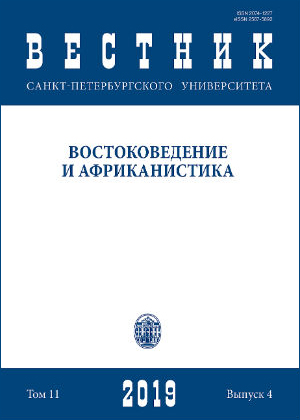Genres of the Oral Tradition of the Manden Peoples (West Africa)
DOI:
https://doi.org/10.21638/spbu13.2019.408Abstract
This article is devoted to the problem of the Manden oral literature genres’ classification. The first thing that we believe to be important in studying the cultural and psychological characteristics of any people and its folklore it is the task to put ourselves in the position of these people. We have to understand what they themselves conclude to be this or that institution or instrument, what they mean to be a particular concept. The main task is to examine the own definition of oral tradition genres by Manden peoples themselves; identifying what underlies the division of texts into genres. In this study, we relied on both oral and written sources; we examined the genres of Bamana, Maninka and Dyula peoples, inhabiting Mali, Guinea and Cote d’Ivoire. The division into genres accepted in modern science is too universal and it does not correspond to African cultures. First of all, the Manden peoples classify genres according to their degree of importance, i. e. significance for the tradition, which is associated with the functionality and genre’s ceremonialism. At the same time, it is the texts including a large amount of magical energy Nyama. As for Bamana and Maninka, where there is an institute of griots, the most significant texts are those that can only be performed by griots (epic, fasa), the age and status restrictions for the performer are an indicator of the text significance also. The most important texts are those that tell us about the origin of a clan, village, person, object, etc., and those that contain words with nyama magic energy. The article describes the words characterizing the genres of folklore in Bamana and Maninka languages, as well as Dyula Kong, and the specifics of their using. For a better understanding of the Manding terms, the article also presents the names of Dogon folklore genres in the Tengu and Bamana languages.
Keywords:
oral tradition, genres, manden
Downloads
References
Downloads
Published
How to Cite
Issue
Section
License
Articles of "Vestnik of Saint Petersburg University. Asian and African Studies" are open access distributed under the terms of the License Agreement with Saint Petersburg State University, which permits to the authors unrestricted distribution and self-archiving free of charge.





